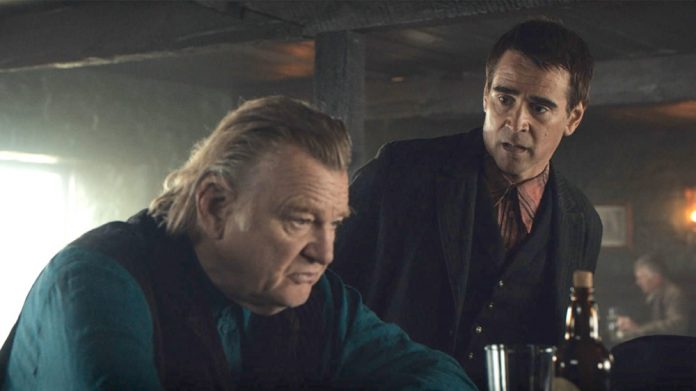Martin McDonagh’s journey from playwright to filmmaker is fairly well documented, though many people don’t know that he won an Oscar early in his career for the short film Six Shooter. His latest effort, The Banshees of Inisherin, is his fourth feature and it looks likely to follow in the golden footsteps of his previous film, Three Billboards Outside Ebbing, Missouri, this coming awards season.
Banshees reunites McDonagh with actors Colin Farrell and Brendan Gleeson, who starred in his feature debut, In Bruges. This time around, they play lifelong friends Pádraic and Colm, who are part of a small Irish island community. The two men have a sudden falling out when Colm abruptly decides he no longer wants to be friends. This simple premise leads to many hilarious moments, though its humor is quite dark, and it only gets darker as the story unfolds.
When Banshees premiered at the Venice International Film Festival, Farrell received the fest’s Best Actor award (beating The Whale’s Brendan Fraser) and McDonagh received the Screenplay award (over Todd Field’s much-admired TÁR). Those two awards indicate that Banshees is likely to bring McDonagh back to the Oscars, this time with his leading men.
Above the Line recently hopped on Zoom to talk with McDonagh about his latest film, with a few tangents into other topics… like why none of his plays have ever been adapted into other forms of media.
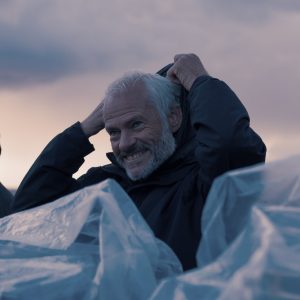
Above the Line: Was Banshees something that you had been developing or writing before the pandemic, and did it become more feasible to make due to the smaller cast involved?
Martin McDonagh: It was written just before the pandemic, actually. The pandemic happened in March of 2020 and it was written over that Christmas period, [so] just before. We had a delay before we could shoot it, so I think COVID somehow imbued itself into the script, just the idea, in some ways, of Brendan Gleeson’s character feeling like he’s wasting time. I think we all had that during that period, like, if we get our freedoms back again, are we gonna waste time like we did before?
ATL: Since you had worked with Colin and Brendan before, was it easy to get them to reunite for Banshees? Had you spoken to them about doing something else since making In Bruges together?
McDonagh: We remained friends ever since then — we knew we wanted to work together. Obviously, I did Seven Psychopaths with Colin after that, but we definitely wanted to get back together as a team because we had so much fun on Bruges, and so many people liked it and have come up to us in the intervening years. It was a grower. It wasn’t massively successful when it first came out, but it’s a film that people have a great fondness for, so all three of us have [had] people coming up and saying how much they liked it.
We definitely wanted to get back together, because it was so much fun working on the first one, but it had to be the right story, and I had to sit down and [write] it. We definitely couldn’t face doing something that wasn’t at least on [the] level of Bruges. We didn’t want to disappoint either ourselves or In Bruges fans, but we also wanted to do something very different, a lot stranger, I guess, maybe, and a lot sadder. I think we pulled it off, I hope.
ATL: I remember part of In Bruges was being able to get out of Ireland and make your first movie in Belgium since Ireland was the setting for most of your plays. Banshees, of course, brings you back to Ireland. When you’re writing, do you know whether you’re writing a movie or a play?
McDonagh: This was always going to be a movie because I knew the location and geography were going to be as much a character as Bruges was in In Bruges. That was always going to be cinematic, I think, and just the idea of getting Colin and Brendan back together… it’s hard to pin them down to a stage play, so getting them on the movie was just the first idea in my mind. But this was always going to be a movie. I always know that if landscapes are involved, if pictures are involved, it’s always going to be a movie. If something’s basically set in a room or two rooms, it’s going to be a play, but this was always going to be a film.
ATL: I’m always surprised that none of your plays have been adapted into other forms of media. Am I wrong there?
McDonagh: I’ve got a complete ban on that happening. Plays should remain plays and films… Oftentimes, if a play is successful, it’s made into a movie, but the idea of it was as a play, so they’re two very distinct art forms, and if you’ve got an eye on making a play a movie, you’re never going to get the play right. I’ve always had a hard and fast rule about that.
ATL: Have you ever seen a play turned into a film that you thought worked better or just as good as a film?
McDonagh: It’s rare, I think. There have been TV adaptations of Harold Pinter stuff in the UK in the ’70s and ’80s, and they were really good. But I think you have to go back to Arsenic and Old Lace or something. Certain Shakespeare things work great as movies, I think of Kurosawa’s Throne of Blood or Ran — they’re epic and cinematic, but it’s the rare case, I think.
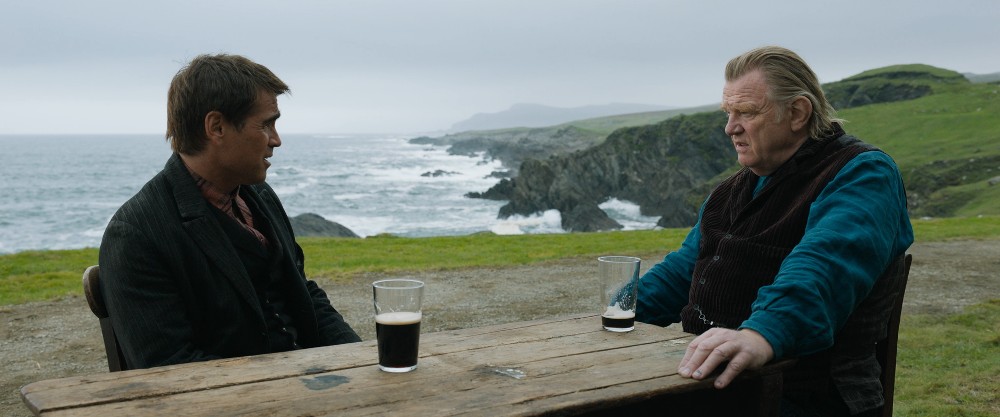
ATL: Going back to the writing process, did you have Colin and Brendan in mind for their respective characters, since you know their voices and personalities?
McDonagh: You know their voices, you know little bits of their characters. You know that Colin can play sensitive, wounded characters beautifully, and you know Brendan, as lovable as he is, can play a harsher, harder character so well, [and] Brendan is also an accomplished fiddler. I knew that was an easy thing to write for him [because] he did that, and he actually came up with the tune in the movie. That’s his composition as well as, obviously, his playing of it. Even those simple aspects gave [me] 20 percent [of] the characters before [I even] started.
ATL: I had the impression that Brendan had some musicality in him. We even saw him playing some kind of mandolin when he recently hosted SNL.
McDonagh: He travels around Ireland, sometimes, playing with friends in a band. He’s a proper Renaissance man.
ATL: I was curious about setting the story in the 1920s as opposed to modern day, although at a certain point, I imagine you’d have to get into cell phones and such, which would change the story a lot.
McDonagh: It’s much more cinematic not to have cell phones. I guess this is my first period film, really, and the costumes and the design added to the movie. In some ways, it feels like a Western, because they’ve got the hats and the long coats, and they all meet in the bar to kind of duke it out, and we see a lot of shots through windows and doorways, like a John Ford movie. But having the backdrop of the [Irish] Civil War, I think, gives the whole story an added level of urgency and poetic detail.
ATL: How did you go about finding the location where you shot the film? Was this a place you’d been to before and thought would be a lovely place to make a movie?
McDonagh: We shot in two locations — two islands, actually — one was Inishmore, which is one of the Aran Islands. My parents live just across the bay in Galway County — you can actually see the Aran Islands from their house. It’s a beautiful place and has been used a lot in Irish literature, and Robert Flaherty‘s Man of Aran movie from the early 1930s was filmed there. Also, in Achill Island, which is a little further up the coast. They’re two of the most beautiful and scenic places on the West Coast, which is very pretty. Getting those cinematic areas of our island was uppermost in my mind when we went to shoot it. They’re not very highly populated, but they are quite beautiful.
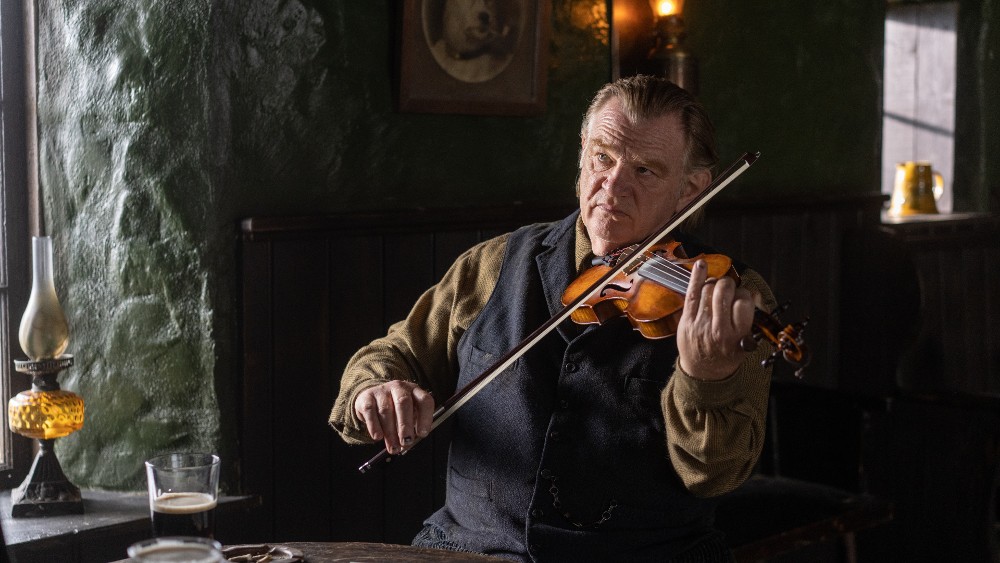
ATL: Was it easy to get the equipment you needed while shooting there? Is there any sort of infrastructure for production?
McDonagh: You have to bring all the cameras and stuff over to the little islands. It’s harder in Inishmore, because it’s all ferries. Achill Island, the second place we shot, is connected by a bridge, so that’s not so hard. You definitely have to ship everything out, either from the UK or from Dublin to get it there.
ATL: I’m always curious about how filmmakers assemble their heads of department. You worked with some of the people from your other movies, like your DP Ben Davis, but then you also have new people like your Editor, Mikkel [Nielsen], and your Production Designer. How did you go about putting together the team? Did you go back to those who worked on Three Billboards and see who was available, or do you like changing things up given the different location?
McDonagh: I’m kind of a creature of habit, so I like to go back to the friends I’ve made on the previous movies. Like, the first AD, Peter Kohn, was on the last two movies, as well. Same with Ben Davis. Mark Tildesley, the production designer, he’s a new guy, but I love him to bits and I’m sure he’ll be on the next ones, too. As a filmmaker, you kind of collect both great people and people who you just get on with as a person. Similarly, with the actors, going back to Brendan and Colin, obviously, but Kerry Condon, who plays Siobhan, we’d worked together, like, 20 years ago — she’s done two or three plays of mine. Barry Keoghan is a new guy to me, but I’d love to work with him again because he’s so good. Most of the subsidiary characters in this movie I’ve worked with on plays, [though] some of them were in Six Shooter, my early short film. The policeman and the priest were both in that.
ATL: Carter Burwell is also one of your regular collaborators, and he kind of outdid himself on Banshees. I’m not sure how much of the music in this film is traditional Irish tunes, but I thought his score was pretty amazing.
McDonagh: Beautiful, beautiful. This is our fourth film together, and every single one of them has [featured] gorgeous tunes, but this one, I agree, especially. It’s really tuneful. We very much didn’t want it to be Irish-set music. We wanted it to be something a little stranger, a little almost fairytale-like, in a way, and yeah, he did an amazing job.
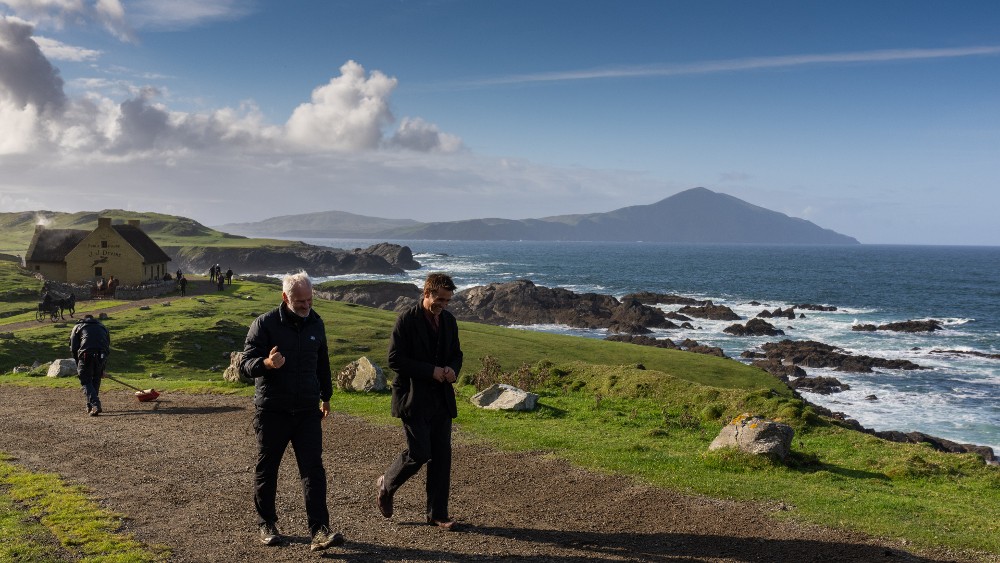
ATL: I try not to know too much about a movie before seeing it, so when this one opened with that gorgeous panoramic shot and his music, it immediately felt like we were in a very different movie than Three Billboards.
McDonagh: Good. I’m glad you saw that. I did want it to have that effect, coming down from the clouds, seeing the island from above, and having this strange piece of music over it. I didn’t want to disconcert people, but [to] know, you’re not in for the regular Irish movie. It’s going to be something a little different.
ATL: Are you someone who starts a project like this and just works on it until completion, and doesn’t work on other things at the same time? Or do you maybe jot down some other, unrelated ideas that you can come back to later?
McDonagh: No, on this one especially, I came up with a script idea and wrote the script and kind of knew that this was going to be the project for the next year or two years. We shot it last summer, but obviously, there [has been] lots of editing and stuff since then, but it’s been only this [project]. I can’t see any other way of working, really. You have to be single-minded, I think, to get something, right.
ATL: At what point in the writing process do you realize, “Okay, this is the one. I’m going to keep working on it and not get distracted…”?
McDonagh: Once it’s finished, you can kind of tell if it’s good enough. Sometimes, I finish and I throw it away because it’s just not good enough. But this one, there was something to it. I really felt like it was a different script [than] anything I’d done before. It’s very funny, but it’s a sadder movie, too, and I knew that if we got it right, we would have something quite different and interesting on our hands.
ATL: When we spoke 14 years ago for In Bruges, you told me that you “weren’t into the whole career thing,” and I was curious whether that’s changed at all in the intervening years. Are you thinking more about your career in terms of the larger body of work that you’re creating?
McDonagh: I guess I’ve got a career now. [laughs] Even though post-pandemic — because I do leave big gaps between the movies — I have, of late, wondered, ‘am I leaving too big [of] gaps, kind of like Brendan’s character in the movie. Should I be doing more work? Should I be devoting more time to it?’ And, I think I should, so I guess I’ll keep going with the career.
Searchlight Pictures will release The Banshees of Inisherin in theaters on Friday, Oct. 21.


